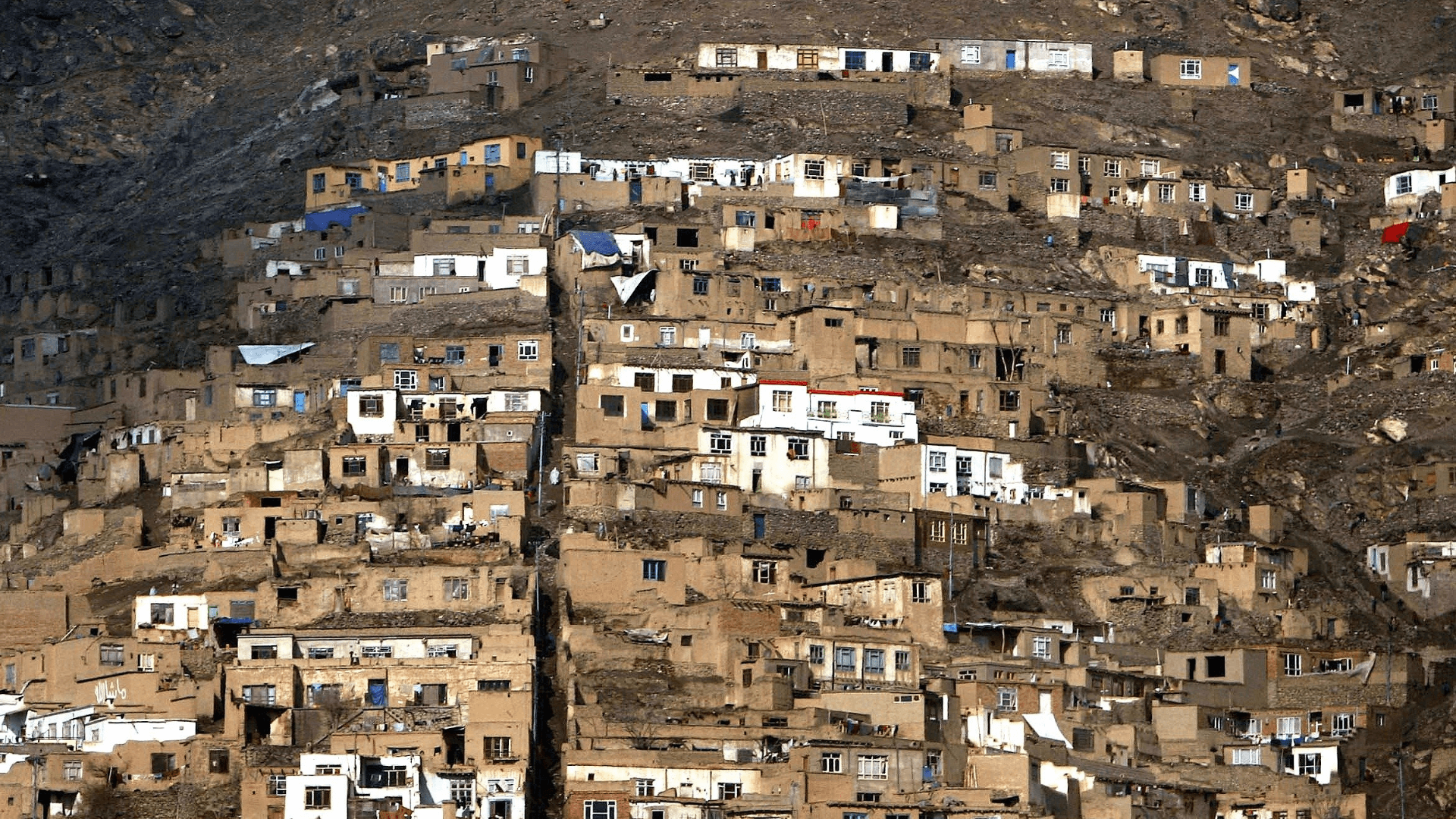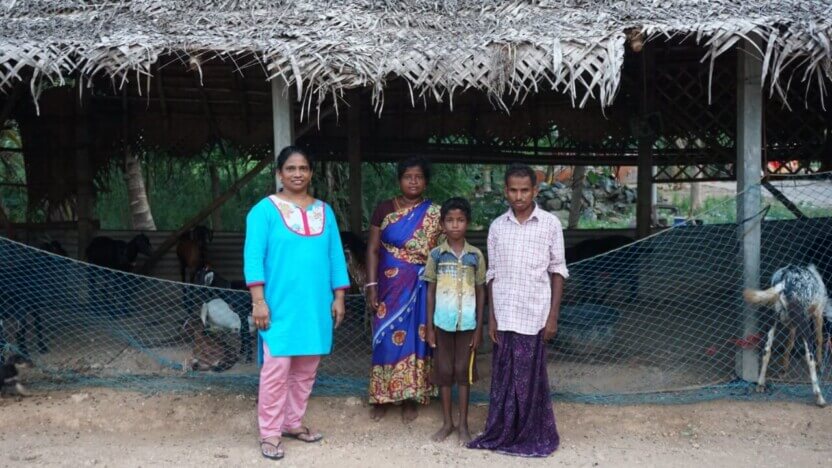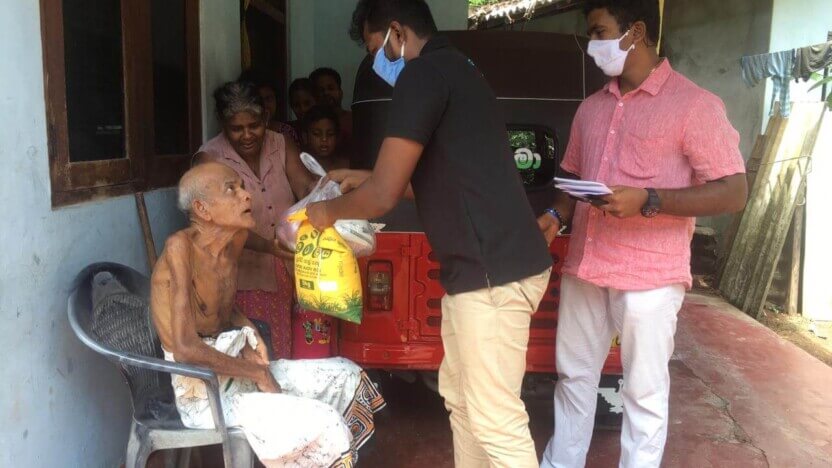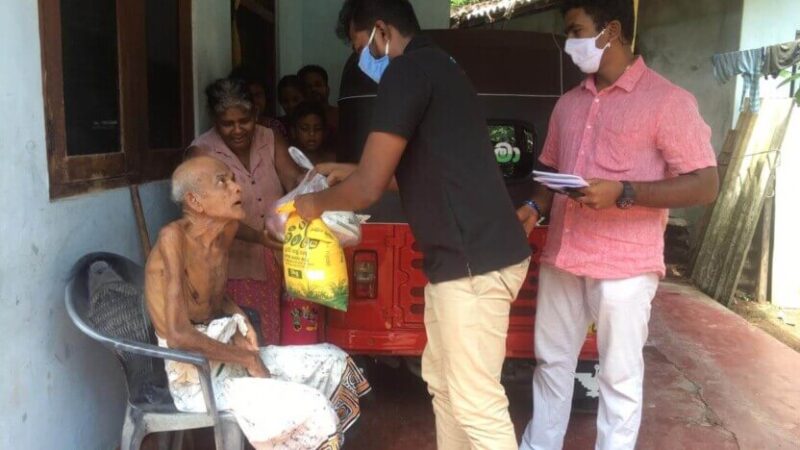Europe
- Before the collapse of communism, the Danish European Mission helped the oppressed church in Eastern Europe. In the 1990s, the focus shifted to the Muslim world, where Christians risk discrimination, harassment or persecution. But at the same time, many Muslims seek answers in Christianity and come to faith in Jesus.
- But Danish European Mission has not forgotten Europe and in 2020 we supported a church in Moldova, Europe's poorest country, to distribute emergency aid in collaboration with Emergency Aid Center Gatten.
Secret projects
For security reasons, we cannot mention in which countries these secret projects take place or describe in detail the nature of the work.
Bible translation for unreached people groups
- In 2020, Danish European Mission's donors have supported the translation of the Bible into a language spoken by a large unreached people group in Central Asia. The Bible text will not only be published in physical form, but also in an app and as an audiobook.
Church planting on the border with Afghanistan

- 2020 was the year Danish European Mission donors began supporting a new evangelization project in a neighboring country to Afghanistan. Local Christians visit villages in the mountains not far from Afghanistan. Hospitality is great in the mountains and Christians have the opportunity to share Bible stories with the families, including Old Testament characters who are also mentioned in the Quran. The Christians tell what the Bible says and a series of conversations lead to the point where they can talk about salvation in Jesus Christ. If the families accept, their home becomes a church. Due to COVID-19, the project had a quiet start in 2020.
Helping vulnerable women in the Muslim world
- 260 women received job training so they could become self-sufficient and escape an abusive marriage, prostitution or sex slavery.
- They were given hairdressing courses, which can be a good source of income, cooking, jewelry and sewing courses.
- A seminar was held to prevent violence against women. 1919 people attended, including youth, police and Muslim leaders.
- Our project partner worked with the authorities to improve conditions for women and they are consulted when passing legislation concerning women.
- Danish European Mission's donors ensured that our partner could buy a new shelter, so there are now two shelters. One shelter for battered women and one for former prostitutes and trafficked women. The contribution to the shelter was almost DKK 800,000.
Victims of natural disaster
- Danish European Mission donors provided support to people in need after a natural disaster. The money was given to poor families who were able to buy food. The Western media has not reported on the natural disaster as there is little news coming out of the country.
Feed for rehabilitation center
- In 2012, the Danish European Mission helped buy 20 sheep, which later became many more. By May 2020, the flock had grown to 92 sheep and 32 lambs.
- Since its inception, the agricultural project has been supported by the Danish European Mission's donors several times, partly in connection with the construction of a stable and shelter, the purchase of neighboring land, the purchase of feed and repair after a catastrophic fire in 2016.
- In May 2020, 11 male residents at the rehabilitation center were given the opportunity to come out of addiction and gain a new life through faith in Jesus.
Helping poor Christians start their own business
- A pastor of an underground church in one of the world's most closed countries received funds to buy a cultivator. Before, his income was around 130 DKK per month, which was not enough to cover the expenses with four children. Because he can earn money from working with the cultivator, he can now earn $650 a month.
- A teenage Christian girl had two parents who were sick. She got help to start a business where women could get eyebrow extensions. She now earns over $300 a month.
- A Christian woman had been a guest worker in another country, but was now in her home country without work and income. She asked our project partner for help and was given a sewing machine, cotton and fabric so she could start a business from home sewing accessories for beds.
Advocacy
- Support for a project partner that works for persecuted Christians in the Middle East through quiet diplomacy. It operates at EU level, but also has projects where it helps in a practical way, including the re-location of converts in danger of death.
Secret meeting on mission in the Muslim world
- Danish European Mission staff met with a number of project partners at a location in the Middle East. The days began with Bible teaching and worship, after which a number of meetings were held throughout the day about how the projects are progressing and how they can be further developed.
Bags of hope
- In 2020, 160 bags of food were distributed to poor people in a country in Central Asia. Through the project, the church is able to build bridges to people it might not otherwise have come into contact with.
Theological education
- In 2020, 39 people received theological education in a Central Asian country with the help of Danish European Mission improvers and donors. Of these, 34 studied theology in a local Turkish language in that Central Asian country. This is the first time in the history of the world that indigenous Christians in this country can receive theological education in their native language.
- Young convert churches can be fragile, so skewed practices can develop, so theological education, as well as training in pastoral care, ethics, leadership, economics, etc. anchor and can create health.
India

- Danish European Mission donors helped donate emergency aid to victims of COVID-19 in India.
- A project in a village was started, but the pandemic put a damper on activity. Our project partner built relationships with the villagers and provided practical help to the vulnerable. Among the beneficiaries were people living below the poverty line, including a widow and people with depression.
- The leader of the project had counseling sessions with families and read the Bible with them.
- Once the pandemic no longer restricts activity, the plan is for the self-help project to really take off, helping villagers create sustainable animal breeding and training women as seamstresses. Our project partner has a large customer who can potentially buy the goods.
Iraq
In 2020, donors ensured that 68,696 people received help.
- The aid consisted of emergency aid for persecuted Christians and people from other minority backgrounds displaced by Islamic State. Recipients received food, water, hygiene items, medicine and cooking utensils.
- Due to COVID-19, the Iraqi authorities contacted our partner, allowing them to continue relief work despite the travel ban in the country.
- Women also received trauma treatment. Women who had been sex slaves for Islamic State were war widows or simply very poor. At a job training center run by convert Christians, they were able to find a community of like-minded people, receive counseling and job training. For some, meeting local Christian converts led them to seek answers in the Bible.
Iran
- In 2020, Danish European Mission donors ensured that 23,000 Persian pocket editions of the New Testament could be printed and distributed to the Iranian population and in neighboring countries where Iranians live. There is an open window these days, and the COVID-19 epidemic has caused some Muslims to fear what happens after death. Therefore, many seek hope in faith in Jesus Christ.
Kyrgyzstan
- Eight girls are staying at Egehuset, a home for former orphans who have no family to stay with when they can no longer live in state-run orphanages.
- At Egehuset, local Christians care for them and encourage the seven girls to complete secondary education, as well as socially equipping them to function in society. Several of the girls have experienced coming to faith in Jesus through their participation in the project.
Mauritania
- A Christian convert from the predominantly Muslim country, where there are almost no Christians, received support for his theological education in 2020. In many countries, the church is growing, but growth can sometimes be unhealthy if leaders are not grounded in God's Word. Not only can doctrinal imbalances occur, but unhealthy practices can also emerge. This is why theological education is essential.
North Korea
- 4794 vegetable boxes were distributed to believers and the poor. The 4794 vegetable boxes were delivered to 6 different provinces to the delight of the recipients.
- Thousands of North Korean Christians received medicine in several batches during 2020. The medicine and vegetable boxes were delivered separately. Medicine and vegetables are essential in a country where the health situation is catastrophic and the public food supply has collapsed.
- With the support of Danish European Mission's donors, it was possible in 2020 to evacuate 49 North Korean refugees from China to a safe third country, which we cannot name for security reasons. North Korean refugees often face hardship in China and live off the books as they are not recognized as refugees and are sent back to North Korea where they are imprisoned.
Sri Lanka

- Due to the COVID-19 epidemic, churches were shut down in Sri Lanka. This led to a high demand for Bibles, so it is a great joy for persecuted Christians that 2174 Bibles could be distributed with the support of Danish European Mission donors.
- The support also equipped 44 pastors to start their own businesses. They started working with chickens, goats, shops and other medium-sized businesses to supplement their income from the church. Due to the pandemic that hit Sri Lanka very hard in 2020, many church members were unable to contribute to their pastor's salary. Therefore, there was a particular need for self-help in 2020.
Syria
In 2020, donors ensured that 73,202 people received help.
- Syria is in a deep economic crisis. The relief consisted of emergency aid in the form of food, hygiene items, water, medicine and kitchen utensils. The target group was both persecuted Christians and people from other minority backgrounds displaced by Islamic State.
- Especially in northern Syria, the church is growing. Many Muslims and people from non-Christian minorities ask questions about the Bible when Christians tirelessly help not only Christians but also non-Christians. Some become interested in hearing about the Bible's message in the face of Christians' acts of love.
- In addition, Christian children received schooling. The school system in Syria has partially collapsed as a result of the civil war that began in 2011. This leads some Christian parents to consider fleeing to the West to secure a better education and future for their children. However, Christians make an important contribution to society and their local churches, and the exodus of Christians must be stopped. By supporting schooling for Syrian Christians, Christian parents can have one less reason to leave civil war-torn Syria.
Turkey
Church planting and church leadership training
- In eastern Turkey, a church planter received support to reach out to Afghan and Iranian migrants. This area is a route that many Iranians and Afghans use on their way to Europe.
- The number of Christians in Turkey is very low, so new churches are needed to reach out to the Turkish population. In 2019-2020, 65 missionaries and their families were expelled from the country, leaving the Turkish church more self-reliant than before. On the one hand, it is wrong that foreign employees are expelled, but on the other hand, the Turkish church is now forced to stand on its own two feet and become independent of the West. Danish European Mission donors have helped Christians receive training in church leadership and church planting. Six people have received Bible teaching and practical training in a number of church ministries. The training takes place over a period of 6 months. In addition, one person has been trained and deployed to strengthen house churches and plant new churches.
Media Mission
- Danish European Mission donors supported SAT7 Turk. The station broadcasts Christian TV in Turkish on Turk Sat, the satellite with the best coverage in Turkey. Some describe SAT7 as the church's showcase to help break down prejudices about Christians, not only converts, but also traditional Christians in Turkey such as Armenians and Assyrians.
- In addition, Danish European Mission donors supported Kanal Hayat, which also broadcasts Christian satellite TV across Turkey. Together with Radio Shema, Kanal Hayat runs the Youtube channel Umut Kalesi, which produces high-quality videos for Turkey's youth.
- Danish European Mission donors supported the creation of Alef FM, which legally broadcasts Christian radio on the FM band in southeastern Turkey. Due to COVID-19, Turks were forced to stay indoors and many had time to listen to Christian radio and search on Alef FM's digital platforms. In 2021, the radio channel had around 300-400 thousand potential listeners. On social media, 39,137 have met Alef FM's message. In the future, our project partner will focus even more on social media, as this platform allows you to get feedback from the recipient. In addition, 96 new programs with the Christian message have been produced.
- Interest in Alef FM, SAT7 Turk and Kanal Hayat increased measurably on social media and in terms of user inquiries during the pandemic - perhaps also as a result of increased spiritual seeking in the Christian faith at a time when a deadly pandemic was raging. Some may have feared where they would spend eternity. In the face of this question, the Bible offers salvation by grace alone - through faith in Jesus Christ - rather than through works of law.
Yemen
- In 2020, donors ensured that 14,089 people received food parcels.
In its sixth year, the brutal war that has sent 80 % of the population into famine continues, with innocent children and adults losing their lives as a result of the war. The UN has assessed that Yemen is experiencing the world's worst humanitarian crisis ever. - The Convert Church continued to grow in the midst of war and famine. One reason is that convert Christians help the most vulnerable by distributing emergency aid among the so-called casteless Muslims, who are socially at the bottom of society. It makes a big impression, not only among the vulnerable, but in society in general.

